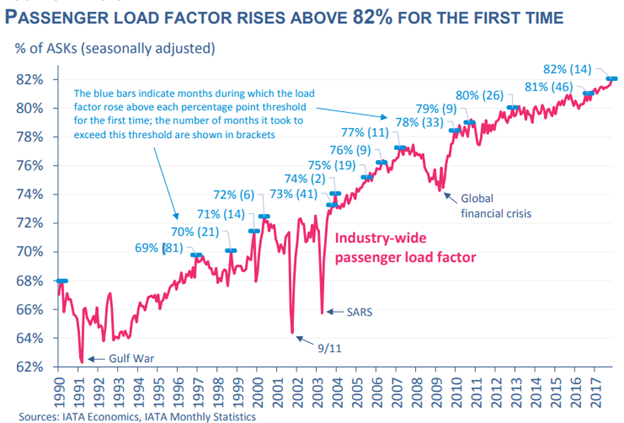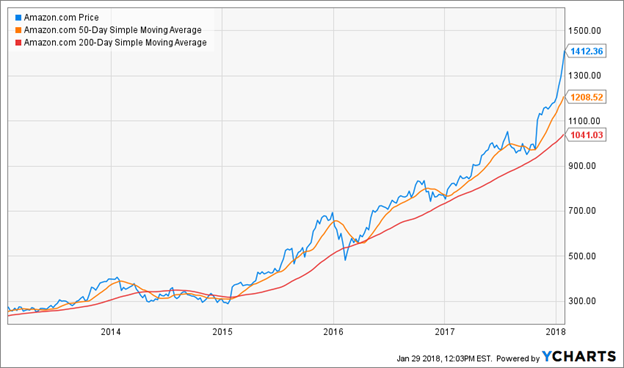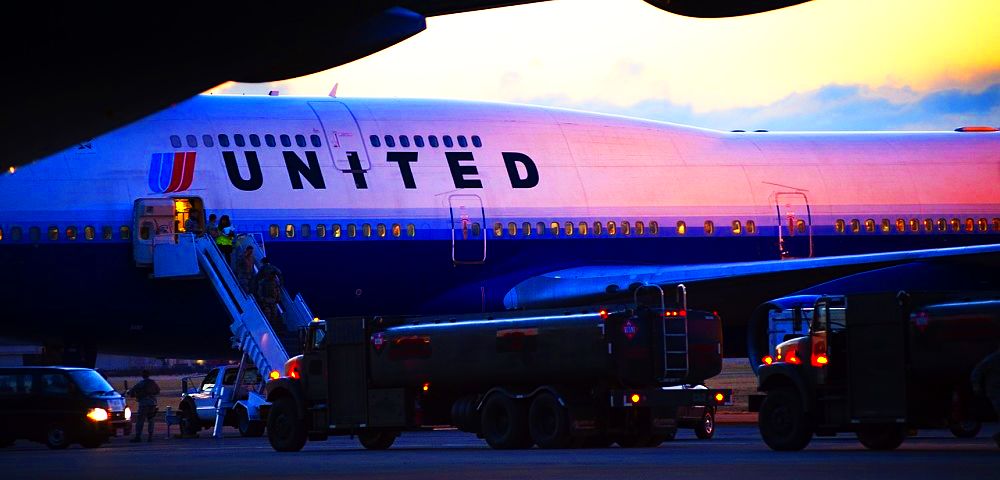One Easy Way to Outsmart Warren Buffett: Avoid Airline Stocks
Berkshire Hathaway Holdings added multiple billion-dollar stakes in American Airlines (AAL
Successful investing should be easy. Buy consistent growth. Flee mediocrity. And never, under any circumstances, buy airlines.
Airline shares got walloped Jan. 24. It began when United Continental posted solid fourth-quarter financial results. Then, surprise, executives announced a price war.
Even in victory, airline managers find ways to lose.
In fairness, United is in a bit of a pickle …
Discount carriers are undercutting their fares in feeder markets. Scott Kirby, United’s chief executive, believes travelers wouldn’t even consider low-cost airlines … not if they could fly United for the same price.
From Kirby’s perspective, the fate of the competition is entirely at the discretion of United.
The master plan is to grow seat capacity for the next three years comfortably above the expected industry growth rate. Excess capacity will drive down prices … and profitability.

Industry-watchers expect this strategy will adversely impact the entire sector. In a note to clients, Darryl Genovesi, an analyst at UBS, predicted carrier incomes would decline an average of 6% to 8%.
Margins are already razor-thin. Invariably, some companies will be forced out of business.
At United, that outcome is part of the calculus.
There is just one problem: Kirby is probably wrong about his basic premise. There is no reason to believe customers will choose United over low-cost carriers. The industry is besieged with terrible customer satisfaction rates. Brand loyalty is even lower.
People hate flying. Given recent events, they especially hate flying United.
Last year a video went viral when United security staff forcibly removed a patron from a crowded flight. He was not intoxicated or obnoxious. He was bumped because United oversold the number of seats on the plane — a standard industry practice.
As staff dragged the passenger from the flight, bloodied and screaming, a longstanding negative stereotype was emphatically reinforced. Airlines do not care about their customers.
In contrast, Amazon.com (AMZN
The strategy is paying off, big time …

In 2017, the polling firm Morning Consult found that Amazon.com was the most-loved brand in America. Customers love the brand so much, they pay a $100 annual subscription … just for the right to shop at its online store and obtain valuable perks.
The result is consistent sales and free cash flow growth, and rapidly rising shareholder wealth.
During the past 10 years, Amazon’s common shares have risen at an average of 33.56%.
Historically, airline corporate managers have shown no such insight.
In 1989, Warren Buffett, the legendary value investor, purchased $358 million worth of U.S. Airways’ debt. The lure was operating leverage. Once an airline meets its operating expenses, almost every additional seat sold is pure profit.
It’s like printing money, in theory. In reality, the business is a slave to massive fixed costs, strong labor unions and pricing dictated by capacity.
At one point, Buffett tried to sell his preferred shares for a 50% loss. He could not find any takers. It took the next two decades for him to recoup his investment. He vowed to never invest in the sector again.
Recently, he was lured back.
Berkshire Hathaway Holdings added multiple billion-dollar stakes in American Airlines, Delta Airlines, Southwest Airlines and United. In a 2017 interview, Buffett explained that industry leaders have learned, through multiple bankruptcies and squandered shareholder wealth, not to add excess capacity — because that is a killer.
Mr. Buffett, meet Mr. Kirby. He sees things differently.
So do I. In fact, I developed a system for making disciplined longer-term investments. It is a service born out of two decades of data science.
At its root is the idea that great investments begin with terrific businesses … proven business plans … and adroit managers who have already demonstrated the ability to create massive amounts of shareholder wealth.
Every month, I add one or two of these stocks to a longer-term portfolio.
They are not flashy names. Nor do they offer extreme leverage. Their underlying businesses are solid, with good margins protected by competitive advantages. They make pizza … operate warehouses … build custom software for niche markets … and otherwise offer “ordinary” services and products that throw off extraordinary returns.
They are boring, steady money-makers. I don’t like surprises, and neither should you. So if you’re in the market for stocks that quietly soar double-digits while the rest of the market misses out, I urge you to consider joining me at The Power Elite today.
Jon Markman is editor of Power Elite, Tech Trend Trader and other publications.
Subscribe to Jon Markman’s Power Elite newsletter here
Subscribe to Jon Markman’s Tech Trend Trader here
About MoneyShow.com: Founded in 1981, MoneyShow is a privately held financial media company headquartered in Sarasota, Florida. As a global network of investing and trading education, MoneyShow presents an extensive agenda of live and online events that attract over 75,000 investors, traders and financial advisors around the world.




